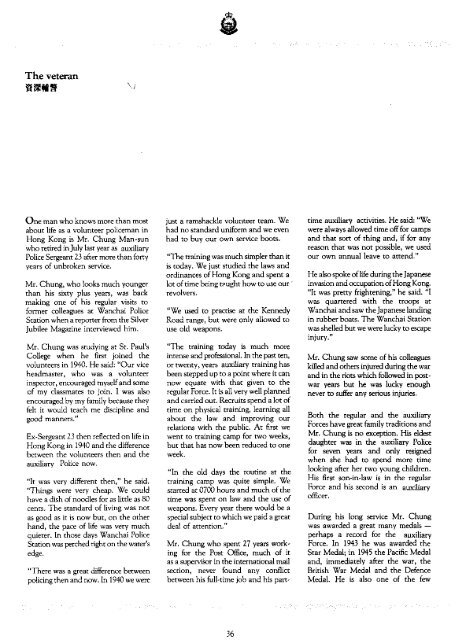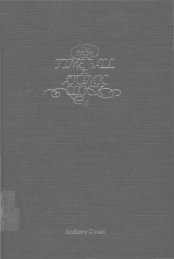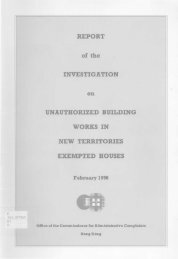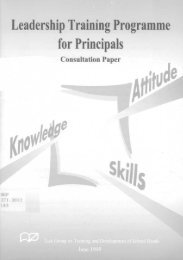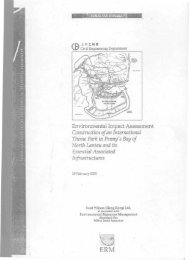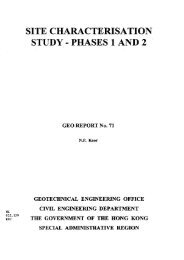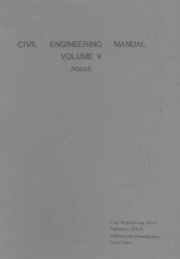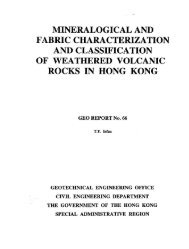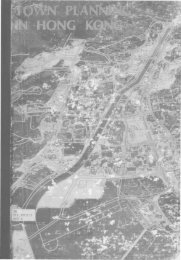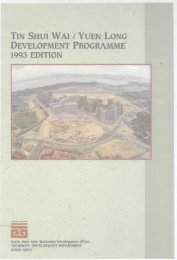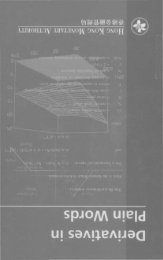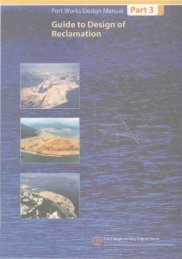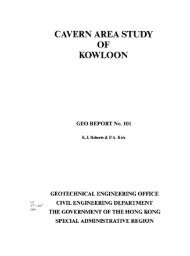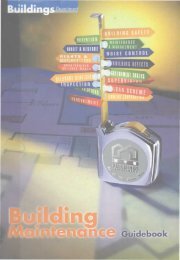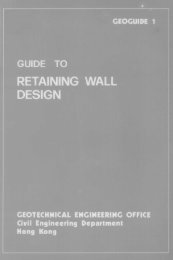Contents - HKU Libraries
Contents - HKU Libraries
Contents - HKU Libraries
Create successful ePaper yourself
Turn your PDF publications into a flip-book with our unique Google optimized e-Paper software.
The veteran<br />
One man who knows more than most<br />
about life as a volunteer policeman in<br />
Hong Kong is Mr. Chung Man-sun<br />
who retired in July last year as auxiliary<br />
Police Sergeant 23 after more than forty<br />
years of unbroken service.<br />
Mr. Chung, who looks much younger<br />
than his sixty plus years, was back<br />
making one of his regular visits to<br />
former colleagues at Wanchai Police<br />
Station when a reporter from the Silver<br />
Jubilee Magazine interviewed him.<br />
Mr. Chung was studying at St. Paul's<br />
College when he first joined the<br />
volunteers in 1940. He said: "Our vice<br />
headmaster, who was a volunteer<br />
inspector, encouraged myself and some<br />
of my classmates to join. I was also<br />
encouraged by my family because they<br />
felt it would teach me discipline and<br />
good manners."<br />
Ex-Sergeant 23 then reflected on life in<br />
Hong Kong in 1940 and the difference<br />
between the volunteers then and the<br />
auxiliary Police now.<br />
"It was very different then," he said.<br />
"Things were very cheap. We could<br />
have a dish of noodles for as little as 80<br />
cents. The standard of living was not<br />
as good as it is now but, on the other<br />
hand, the pace of life was very much<br />
quieter. In those days Wanchai Police<br />
Station was perched right on the water's<br />
edge.<br />
"There was a great difference between<br />
policing then and now. In 1940 we were<br />
just a ramshackle volunteer team. We<br />
had no standard uniform and we even<br />
had to buy our own service boots.<br />
"The training was much simpler than it<br />
is today. We just studied the laws and<br />
ordinances of Hong Kong and spent a<br />
lot of time being taught how to use our '<br />
revolvers.<br />
"We used to practise at the Kennedy<br />
Road range, but were only allowed to<br />
use old weapons.<br />
"The training today is much more<br />
intense and professional. In the past ten,<br />
or twenty, years auxiliary training has<br />
been stepped up to a point where it can<br />
now equate with that given to the<br />
regular Force. It is all very well planned<br />
and carried out. Recruits spend a lot of<br />
time on physical training, learning all<br />
about the law and improving our<br />
relations with the public. At first we<br />
went to training camp for two weeks,<br />
but that has now been reduced to one<br />
week.<br />
"In the old days the routine at the<br />
training camp was quite simple. We<br />
started at 0700 hours and much of the<br />
time was spent on law and the use of<br />
weapons. Every year there would be a<br />
special subject to which we paid a great<br />
deal of attention."<br />
Mr. Chung who spent 27 years working<br />
for the Post Office, much of it<br />
as a supervisor in the international mail<br />
section, never found any conflict<br />
between his full'time job and his part-<br />
36<br />
time auxiliary activities. He said: "We<br />
were always allowed time off for camps<br />
and that sort of thing and, if for any<br />
reason that was not possible, we used<br />
our own annual leave to attend."<br />
He also spoke of life during the Japanese<br />
invasion and occupation of Hong Kong.<br />
"It was pretty frightening," he said. "I<br />
was quartered with the troops at<br />
Wanchai and saw the Japanese landing<br />
in rubber boats. The Wanchai Station<br />
was shelled but we were lucky to escape<br />
injury."<br />
Mr. Chung saw some of his colleagues<br />
killed and others injured during the war<br />
and in the riots which followed in postwar<br />
years but he was lucky enough<br />
never to suffer any serious injuries.<br />
Both the regular and the auxiliary<br />
Forces have great family traditions and<br />
Mr. Chung is no exception. His eldest<br />
daughter was in the auxiliary Police<br />
for seven years and only resigned<br />
when she had to spend more time<br />
looking after her two young children.<br />
His first son-in-law is in the regular<br />
Force and his second is an auxiliary<br />
officer.<br />
During his long service Mr. Chung<br />
was awarded a great many medals —<br />
perhaps a record for the auxiliary<br />
Force. In 1943 he was awarded the<br />
Star Medal; in 1945 the Pacific Medal<br />
and, immediately after the war, the<br />
British War Medal and the Defence<br />
Medal. He is also one of the few


